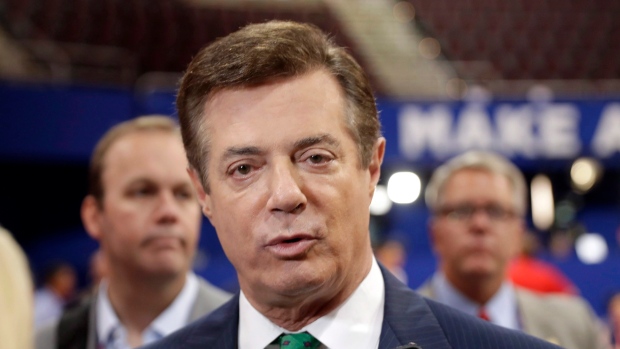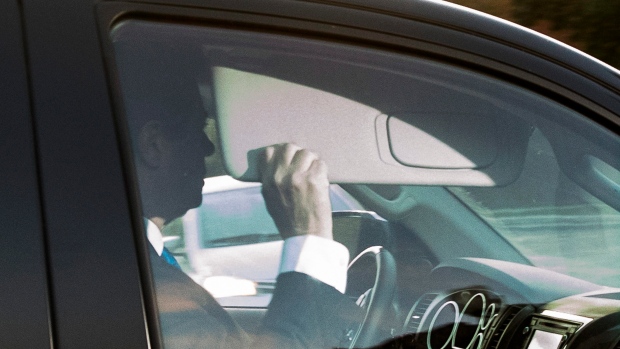Oct 30, 2017
Trump's ex-campaign manager Manafort indicted; former adviser pleads guilty
, Bloomberg News

Paul Manafort, a former campaign manager for President Donald Trump, and his onetime business partner Rick Gates were charged with conspiracy against the U.S., the first people charged in the broad investigation into Russian meddling with the U.S. election.
Manafort laundered more than $18 million to support a “lavish lifestyle,” including buying U.S. real estate, and of defrauding financial institutions that loaned him money, according to an indictment unsealed Monday. He and Gates, his longtime deputy, hid foreign accounts from the U.S., failed to disclose their work for a foreign government and misrepresented their work to authorities as recently as 2017, according to the indictment.
Those accusations, laid out in a 12-count indictment after a monthslong investigation, indicate that Special Counsel Robert Mueller’s probe is intensifying and could pose a danger to the White House. Investigators are likely to pressure the pair to cooperate with prosecutors in a bid for leniency and to disclose everything that they know about Trump’s campaign.
Prosecutors on Mueller’s team revealed Monday that a foreign policy adviser on Trump’s campaign, George Papadopoulos, pursued Russia’s help in the 2016 U.S. presidential campaign and sought to open communication lines to the Kremlin. Papadopoulos worked with an international professor who promised compromising information from Russia about Democratic candidate Hillary Clinton. He also met with a Russian woman he believed could broker a meeting between the campaign and Russian officials.
He then lied about the timing and content of those interactions to agents of the Federal Bureau of Investigation. On October 5, Papadopoulos pleaded guilty to lying in a sealed document that was made public Monday in Washington D.C. Ominously for the White House, Papadopoulos is cooperating with the investigation.
Trump has repeatedly dismissed the probe as “the single greatest witch hunt in American political history.” The White House appeared rattled over the weekend, and on Sunday administration officials were uncertain who would be arrested, with the president tweeting that investigators should focus instead on Hillary Clinton and the Democratic Party.
Early Monday, prosecutors told Manafort and Gates to surrender. Mueller’s demand caught both men by surprise, with their allies confident that they were safe for now.
Manafort, wearing a suit and tie, drove past a crowd of photographers and cameramen in a black SUV as he left his Alexandria, Virginia, home around 8 a.m., according to photos and videos posted on Twitter. Gates lives in Richmond, Virginia. The two are scheduled to appear in court later Monday.
PARDON POWER
The federal charges put the prospect of a presidential pardon front and center, a potential wild card for Mueller’s investigation. Trump has said on Twitter that the president has “complete power” to pardon. But doing so could deepen the legal trouble of those in Trump’s circle because prosecutors could then try to compel pardoned individuals to testify since they lose some Fifth Amendment protections.
Manafort is also under investigation by authorities in New York state, where the president wouldn’t have authority to issue a pardon.
Trump’s reaction to the charges -- which could also include messages to witnesses to stay quiet -- should be watched carefully, former U.S. attorney Preet Bharara said on CNN’s “State of the Union.”
Manafort, 68, has been under investigation by Mueller for months for work before he joined the Trump campaign. A top Republican strategist who also worked extensively for foreign politicians, he left the presidential campaign after only a few months in 2016 when information surfaced about his earlier work in Ukraine for a pro-Russian party, which intensified scrutiny of his past business dealings.
Gates worked with Manafort on Trump’s campaign and political campaigns in Ukraine. After Manafort left the campaign, he stayed on and later joined the president-elect’s inaugural committee. He was said to be working with Thomas Barrack, a wealthy Los Angeles investor and Trump confidant, and the two often visited the White House together.
The charges were filed in federal court in Washington. Calls to representatives for the two men weren’t immediately returned.
Manafort joined Trump’s campaign in March 2016 and managed it from June to August, when he resigned amid questions about his work for pro-Russian politicians in Ukraine. He has said he knows nothing of Russian interference. Mueller is also investigating possible obstruction of justice by Trump and other crimes by his associates.
Mueller’s office was especially aggressive in its pursuit of Manafort, scrutinizing whether he laundered money from Eastern Europe into New York properties, complied with the Foreign Agents Registration Act, and paid taxes on international clients he advised, particularly in Ukraine.
VIRGINIA HOME
FBI agents picked the lock of his northern Virginia home in July, frisking his wife and copying data from his electronic devices, according to a person familiar with the matter. Manafort was also the subject of two separate FBI wiretap investigations approved before and after the election under the Foreign Intelligence Surveillance Act, CNN has reported.
Manafort has said he cooperated with congressional inquiries about the campaign even as Mueller’s prosecutors combed through his taxes and finances

As campaign chairman, Manafort attended an infamous June 2016 meeting between the president’s son, Donald Trump Jr., and a Russian lawyer that was set up on the pretext of offering incriminating information about Trump’s opponent, Democrat Hillary Clinton. Manafort disclosed the meeting to congressional investigators, who interviewed participants seeking evidence of collusion.
Manafort, whose father was mayor of New Britain, Connecticut, is a lawyer who made his name working for Republican presidential candidates. He helped Gerald Ford collect delegates at the 1976 GOP convention, advised Ronald Reagan in 1980, and worked with the campaigns of George H.W. Bush in 1988 and Bob Dole in 1996.
He started lobbying and political-consulting firms with Lee Atwater and Roger Stone. They upended the way Washington lobbying worked by helping politicians win and then cashing in on the success, what one critic called an “institutionalized conflict of interest.” Manafort later formed a firm with Rick Davis, who left to run the presidential campaign of John McCain, a senator from Arizona, in 2008.
FOREIGN LEADERS
His firms advised foreign leaders, some with unsavory reputations, on how to woo voters and make themselves more palatable to Washington. His roster included Filipino dictator Ferdinand Marcos, Angolan guerrilla leader Jonas Savimbi, and deposed Ukrainian leader Viktor Yanukovych, an ally of Russia’s Vladimir Putin.
The work was particularly lucrative in Ukraine, where Yanukovych’s Party of Regions hired Manafort in advance of the 2004 election to recast its image, which had been marred by election fraud allegations.
He helped teach Yanukovych, a pro-Russian candidate, to look and speak like an American politician before he won the presidency in 2010. Manafort also helped him defend the imprisonment of his rival, Yulia Tymoshenko, an act widely condemned in the Western world.
Yanukovych left office in the 2014 Ukrainian revolution and now lives in exile in Russia.
A handwritten ledger later found in the party’s head office said Manafort was paid at least $12.7 million from 2007 to 2012, prompting the FBI to investigate whether the ledger reflected any illegal payments. In June, Manafort retroactively filed a foreign agent registration document that said the Party of Regions paid him $17.1 million in 2012 and 2013.
The Manafort inquiry initially focused on actions involving a real-estate company he created in 2008 with a $25 million investment from a Ukrainian oligarch, Dmitry Firtash. It was supposed to develop a luxury skyscraper on New York’s Park Avenue, according to court records.
REAL PURPOSE
But the project was shuttered in 2009. Tymoshenko, the jailed former Ukrainian prime minister, claimed in a lawsuit that the real purpose of the investment was to launder money that Firtash obtained improperly by skimming sales of natural gas to Ukraine.
A judge dismissed the lawsuit in 2015. Firtash, now in Austria, is accused in an unrelated U.S. case of paying bribes in violation of the Foreign Corrupt Practices Act.
The idea of working in Ukraine first came to Manafort in 2004 from Oleg Deripaska, a Russian billionaire who controls aluminum producer Rusal. Manafort worked on behalf of Deripaska’s businesses to gain access to markets in the European Union and elsewhere, according to a person familiar with the matter. The consulting arrangement ended by 2007.
In 2008, Deripaska put $18.9 million into a private equity fund, based in the Cayman Islands, that Manafort created to invest in businesses in Eastern Europe. Money for the transaction moved through a web of companies in tax havens like the Caymans and Cyprus. Deripaska also paid $7.35 million in management fees.
Gates was Manafort’s longtime business partner. He stayed with the Trump campaign even after Manafort stepped down as chairman and played a crucial role in organizing the campaign’s strategy to win enough Republican delegates to secure the nomination. He then worked closely with Trump’s family members to fight off a campaign to get delegates to abandon Trump before the Republican National Convention.
Gates attended several meetings at the White House after Trump became president, according to one former staff member. Trump sought to distance himself from Gates and grew angry after he learned that Gates was still at the White House, two people familiar with the matter said.